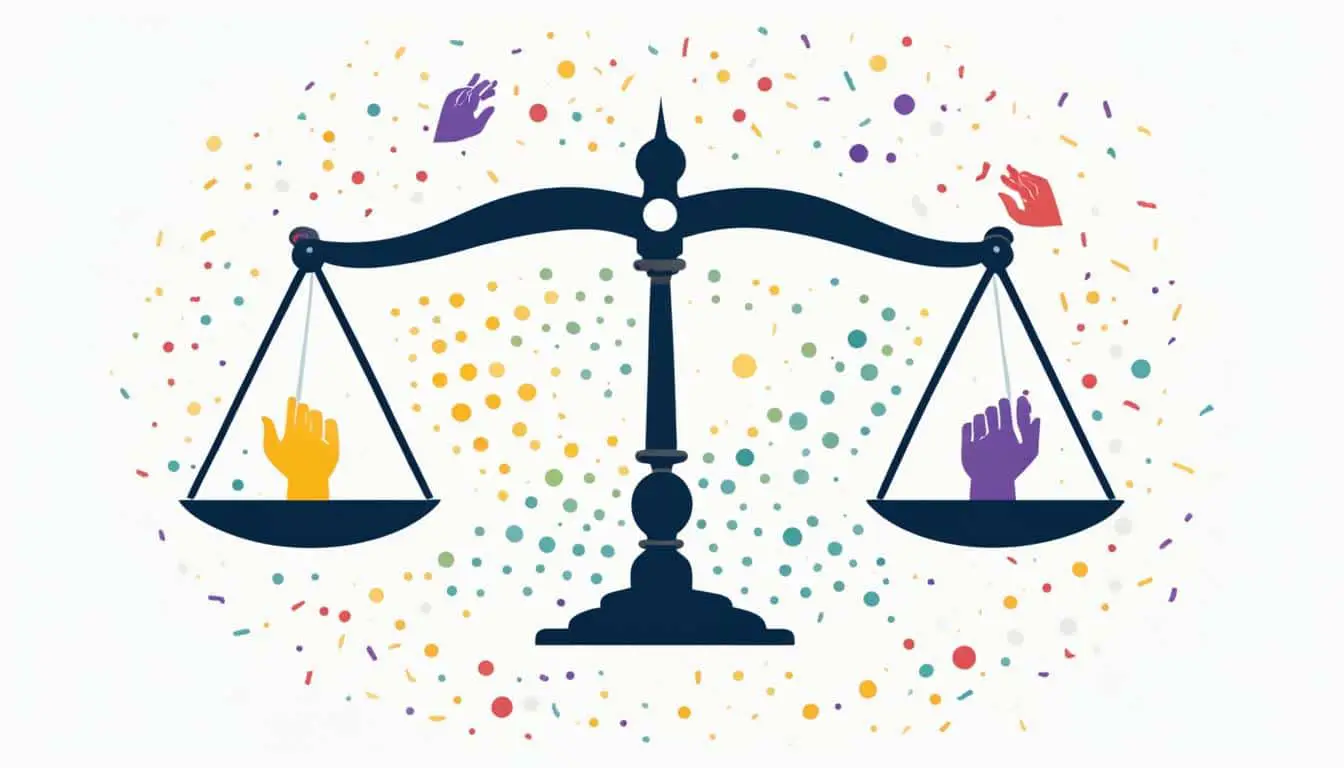
Justice and Fairness in Biblical Laws: An Analysis
The concept of justice and fairness is fundamental to biblical laws, shaping moral conduct and societal norms. In this article, I will explore the origins, principles, and modern-day relevance of justice and fairness in biblical laws, highlighting their impact on contemporary debates and ethical decision-making.
Key Takeaways:
- Justice and fairness are central principles in biblical laws.
- These principles originated from religious texts like the Torah and the Old Testament.
- Impartiality, proportionality, restitution, and equality are key aspects of justice and fairness in biblical laws.
- The influence of biblical laws extends beyond ancient Israelite society, shaping modern legal systems and societal norms.
- The teachings of biblical laws continue to inspire individuals and communities to strive for fairness, equality, and the protection of human rights.
Origins of Biblical Laws
Biblical laws find their origins in religious texts such as the Torah and the Old Testament. These laws were believed to be divinely ordained and served as a guide for moral conduct, social order, and governance in ancient Israelite society. The principles of justice and fairness formed the foundation of these laws, emphasizing the importance of equitable treatment, restitution, and the well-being of all individuals within the community.
| Concept | Description |
|---|---|
| Religious Texts | The Torah and the Old Testament serve as the foundation for biblical laws, providing guidance on moral conduct and governance. |
| Divine Ordination | Biblical laws were believed to be ordained by a higher power, reflecting divine will and establishing a sacred authority. |
| Justice and Fairness | The principles of justice and fairness underpin biblical laws, promoting equitable treatment, restitution, and community well-being. |
The origins of biblical laws in religious texts provided a moral compass and a framework for social order in ancient Israelite society. These laws were deeply rooted in the principles of justice and fairness, ensuring that individuals were treated fairly and protected within their community.
Principles of Justice and Fairness in Biblical Laws
The principles of justice and fairness play a pivotal role in shaping biblical laws. Rooted in ancient wisdom and divine guidance, these principles uphold the belief in equitable treatment and moral responsibility. Let’s explore the key aspects that define justice and fairness within the framework of biblical laws.
Impartiality
Central to the concept of justice in biblical laws is impartiality. It ensures that all individuals, regardless of their social standing or circumstances, receive equal treatment under the law. By considering each person’s unique circumstances without bias or favoritism, biblical laws promote a system of justice that commits to fair judgment for all.
Proportionality
Biblical laws emphasize the principle of proportionality when seeking justice. This principle entails that the punishment or restitution should correspond to the severity of the offense committed. By maintaining a balance between the harm caused and the appropriate response, biblical laws aim to administer fair consequences and promote the restoration of justice.
Restitution
Restitution stands as a key principle of fairness within biblical laws. It recognizes the importance of repairing the harm caused by an individual’s actions. In cases of wrongdoing, biblical laws prescribe the restitution of damages as a means of restoring justice and reconciling both the victim and the offender.
Equality before the Law
Biblical laws uphold the principle of equality, ensuring that every individual is subject to the same laws and regulations. Regardless of one’s social status or position, all individuals are expected to be treated fairly and held accountable for their actions. This commitment to equality before the law creates a just and harmonious society.
“And you shall do no wrong, nor harm, nor injury to any man nor oppress him.” – Leviticus 19:13

| Biblical Principle | Description |
|---|---|
| Impartiality | Ensuring equitable treatment for all individuals, regardless of their circumstances. |
| Proportionality | Administering punishments or restitution that align with the severity of the offense committed. |
| Restitution | Repairing the harm caused by an individual through the provision of compensation or restitution. |
| Equality before the Law | Subjecting every individual to the same laws and regulations, irrespective of social status. |
Impact of Justice and Fairness in Biblical Laws
The principles of justice and fairness in biblical laws have had a profound impact that extends far beyond the boundaries of ancient Israelite society. These principles have influenced subsequent legal systems, ethics, and moral frameworks, shaping the development of Western jurisprudence and societal norms.
The emphasis on justice and fairness in biblical laws continues to resonate in modern-day debates, particularly in discussions about social justice, human rights, and the role of law in maintaining a just and equitable society. The enduring significance of these principles highlights their timeless relevance and the enduring wisdom contained within biblical teachings.
Throughout history, biblical laws have served as a moral compass, guiding individuals and societies toward principles of justice and fairness. They have inspired people to fight for equality and to challenge systems that perpetuate injustice.
“The righteous care about justice for the poor, but the wicked have no such concern.” – Proverbs 29:7
The Influence on Legal Systems
The impact of justice and fairness in biblical laws can be seen in the development of legal systems around the world. The concepts of equality before the law and impartiality in decision-making trace their roots back to biblical principles.
Biblical laws emphasized the importance of fair and just treatment for all individuals, regardless of their social status or background. This emphasis on equality and impartiality has shaped the foundation of modern legal systems, promoting the idea that justice should be blind and accessible to all.
The Ethical Framework
The principles of justice and fairness in biblical laws also serve as a moral and ethical framework for individuals and societies. They provide guidance on how to treat others, resolve conflicts, and promote a harmonious social order.
These principles urge individuals to consider the impact of their actions on others and to strive for fairness in their interactions. The concept of justice calls for the righting of wrongs and holding individuals accountable for their actions, while fairness seeks to ensure that everyone is treated equitably and given the opportunity to thrive.
Impact on Societal Norms
The influence of justice and fairness in biblical laws has permeated societal norms and expectations. They have shaped cultural values and expectations, guiding individuals and communities in their pursuit of a just and ethical society.
These principles have had a lasting impact on perceptions of right and wrong, influencing societal attitudes toward issues such as discrimination, inequality, and social responsibility. They continue to inspire individuals and communities to work towards creating a more just, inclusive, and equitable world.
| Impact | Description |
|---|---|
| Ethical Decision-Making | Biblical principles of justice and fairness offer a framework for individuals to make ethical decisions and consider the impact on others. |
| Social Justice Movements | The emphasis on justice and fairness in biblical laws has influenced social justice movements throughout history, inspiring individuals to fight for equality and justice for all. |
| Legal Systems | The principles of justice and fairness in biblical laws have shaped the development of legal systems, promoting equality before the law and impartiality in decision-making. |
| Societal Values | The influence of justice and fairness in biblical laws has shaped societal norms, promoting a sense of responsibility, equality, and respect for others. |
Modern-Day Relevance of Justice and Fairness in Biblical Laws
Despite the vast temporal and cultural differences between ancient Israelite society and the modern world, the principles of justice and fairness in biblical laws continue to hold immense relevance today. These timeless concepts of justice, fairness, and equitable treatment remain fundamental components of a just society.
The teachings of biblical laws serve as a guiding light, inspiring individuals and communities to strive for fairness, equality, and the protection of human rights. By examining the modern-day applications of these principles, we can further understand the significance and impact biblical laws have on contemporary societies.
One of the key aspects of modern-day relevance is the concept of equitable treatment. Biblical laws emphasize the importance of treating all individuals fairly and impartially, regardless of their social status or circumstances. This principle promotes equality before the law and seeks to ensure that justice is blind and impartial.
Restitution is another critical component of biblical laws that holds significant relevance today. The idea of making amends for wrongdoing and providing restitution to those who have been wronged is an essential aspect of justice. It emphasizes the importance of restoring balance and addressing the harm caused to individuals and communities.
The pursuit of justice itself remains a central pillar of modern society. Biblical laws underscore the need for individuals and institutions to actively seek justice, promote the well-being of all members of society, and stand against oppression and injustice. The principles of justice and fairness in biblical laws call upon individuals to be proactive in promoting a just society and upholding the rights and dignity of all.
By recognizing the modern-day relevance of these principles, we can strive to integrate them into our legal systems, ethical frameworks, and societal norms. This can lead to a more just and equitable society that values the well-being and rights of every individual.
Modern-Day Applications of Justice and Fairness in Biblical Laws
| Modern-Day Relevance | Application |
|---|---|
| Protecting Human Rights | Advocating for equal rights, freedom, and dignity for all individuals, irrespective of their background or circumstances. |
| Promoting Social Justice | Fighting against social inequalities, discrimination, and the marginalization of vulnerable populations. |
| Ensuring Impartial Legal Systems | Striving for a justice system that treats all individuals equitably and upholds the principles of due process and fairness. |
| Restorative Justice | Implementing processes for repairing harms caused by offenses, aiming to foster healing, reconciliation, and rehabilitation. |
| Community Welfare | Developing policies and initiatives that prioritize the well-being and prosperity of all members of society. |
The modern-day relevance of justice and fairness in biblical laws is a testament to their enduring wisdom and ethical principles. By drawing inspiration from these teachings, we can strive to build a more just and equitable world for present and future generations.

Applying Justice and Fairness in a Contemporary Context
Applying the principles of justice and fairness in a contemporary context requires a profound understanding of the values and objectives that underpin biblical laws. In the ever-evolving world we live in, it is essential to adapt these principles to address the unique challenges and complexities of modern society while staying true to the spirit of justice and fairness. By incorporating the timeless teachings of biblical justice and fairness, we can guide our ethical decision-making, foster social equality, and strive for a more just and inclusive society.
Justice and fairness, as taught in biblical laws, provide a moral compass for our actions. They remind us that everyone deserves equal treatment and that their rights and dignity must be upheld. In a world where systemic inequities persist, applying justice means taking concrete steps to rectify imbalances and promote meaningful change.
Similarly, applying fairness requires us to consider the nuanced needs and circumstances of individuals within our contemporary context. It means recognizing and addressing the intersectionalities of race, ethnicity, gender, socioeconomic status, and more, ensuring that equity and opportunity are accessible to all.
“True peace is not merely the absence of tension; it is the presence of justice.” – Martin Luther King Jr.
Guiding Ethical Decision-Making
Applying justice and fairness in a contemporary context influences our moral decision-making. By drawing inspiration from biblical teachings, we can navigate complex ethical dilemmas with compassion and wisdom. The principles of justice and fairness compel us to act with integrity, truthfulness, and consideration for the greater good.
Promoting Social Equality
In a society plagued by inequality, it is our responsibility to actively promote social justice. Applying the principles of justice and fairness means standing up against prejudice, discrimination, and unfair practices. By advocating for equal rights, access to resources, and opportunities for all individuals, we can contribute to a more egalitarian society.
Fostering a More Just and Inclusive Society
Creating a just and inclusive society requires deliberate action on both individual and collective levels. Applying justice and fairness in our interactions, institutions, and policies enables us to build a society that values and respects the rights and dignity of every person. It involves cultivating empathy, dismantling systemic barriers, and working towards equitable outcomes for all members of our communities.
| Benefits of Applying Justice and Fairness in a Contemporary Context |
|---|
| Promotes equality and equity |
| Strengthens social cohesion and harmony |
| Fosters trust and legitimacy within institutions |
| Encourages ethical behavior and moral development |
| Supports the well-being of diverse communities |
Conclusion
The principles of justice and fairness form the bedrock of biblical laws, permeating every aspect of moral conduct, social order, and legal systems. The enduring impact of these principles is evident throughout history, as they have shaped the development of Western jurisprudence and ethical frameworks. Understanding and applying these principles in a contemporary context is essential for fostering a more just and equitable society.
By embracing the essence of justice and fairness in biblical laws, individuals and communities can actively contribute to a better world for all. The teachings of these laws inspire us to uphold the values of equitable treatment, restitution, and the pursuit of justice. They serve as a constant reminder of the importance of balancing individual rights and communal responsibilities.
As we navigate complex societal challenges, the principles of justice and fairness derived from biblical laws remain relevant today. They guide us in promoting social equality, upholding human rights, and ensuring the well-being of all members of our diverse communities. By incorporating these principles into our ethical decision-making and legal systems, we can continue to build a more just and inclusive society.
FAQ
What are biblical laws?
Biblical laws are laws that find their origins in religious texts such as the Torah and the Old Testament. They served as a guide for moral conduct, social order, and governance in ancient Israelite society.
What principles of justice and fairness are emphasized in biblical laws?
The principles of justice and fairness in biblical laws include impartiality, proportionality, restitution, and equality before the law. These principles aim to ensure equitable treatment for all individuals, regardless of their social standing or circumstances.
How did biblical laws influence subsequent legal systems and societal norms?
The principles of justice and fairness in biblical laws had a profound impact on the development of Western jurisprudence and societal norms. They influenced subsequent legal systems, ethics, and moral frameworks.
Do the principles of justice and fairness in biblical laws still hold relevance today?
Yes, despite the vast temporal and cultural differences, the principles of justice and fairness in biblical laws continue to hold relevance today. They are fundamental components of a just society and inspire individuals and communities to uphold fairness, equality, and human rights.
How can the principles of justice and fairness in biblical laws be applied in a contemporary context?
Applying the principles of justice and fairness in a contemporary context involves understanding the underlying values and objectives of biblical laws and adapting them to address the unique challenges of modern society. It helps guide ethical decision-making, promote social equality, and foster a more just and inclusive society.
